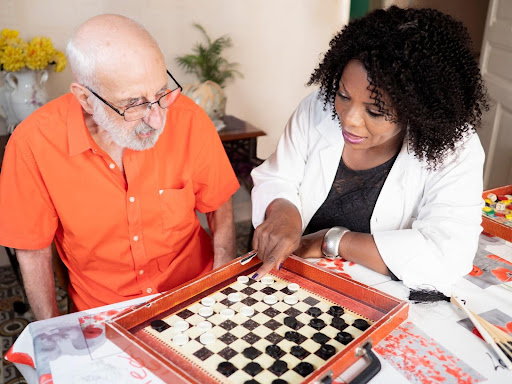
Fun and Easy Memory Games for Loved Ones with Early-Stage Dementia
Games are among the many activities that can keep the human mind entertained and engaged. But more importantly, games can help keep our brains stimulated. This is extremely important for older adults, especially those at risk of dementia. If your loved one is aging at home and needs a bit more attention to keep their brain active, call Visiting Angels of Toms River at (732) 240-1050 to match with a compassionate, professional caregiver who can engage your senior loved one and improve their overall mood and give you peace of mind that they are taken care of when you can’t be there.
Studies from the National Institutes for Health show the multiple benefits of cognitive-stimulating activities like memory-related games, both for overall brain health and for those with Alzheimer’s or dementia. While nothing can stop or consistently slow the progression of these types of conditions, certain activities can help with a person’s current state. Additionally, brain games can be fun and provide beneficial social interaction for those with dementia and their caregivers.
Card and Board Games
A simple card or board game is great for those with dementia. Most older adults are familiar with the general rules and might just need a quick refresher. If you’d like an easier option, try teaching or reminding them how to play “War” (the highest card wins and takes the cards). Children’s board games like Chutes and Ladders are also great for those with cognitive decline.
Bingo
Similar to card games, bingo is generally familiar to older adults. This activity can trigger long-term memory for cognitive stimulation and can improve socialization when played in a group. Try bingo cards with fewer numbers or numbers that are in numerical order. Additionally, large print cards or cards with sliding markers can help individuals with declining eyesight or dexterity issues.
Trivia
Trivia is a fun brain game that doesn’t require many materials. For those with dementia, try simple object trivia. For example, lead them to answer “scissors” after telling them about a sharp, two-bladed object with handles used to cut. Another way to play is to ask simple questions about things from their earlier years. Questions like “Who sings the song ‘Hound Dog’?” will help your loved one reminisce and can lead to a discussion about their memories of that song.
Crossword Puzzles
Individuals with memory impairment frequently struggle with recalling words. Crossword puzzles are challenging yet stimulating word games that can help those with early-onset dementia and those who can still meet the challenge of such a game. Choose a large-print book of crosswords or find them free online (AARP has a free daily puzzle for printing here). Puzzles may include common phrases like “April showers bring May [blank].” Caregivers can set a goal with your loved ones based on their cognitive ability, such as completing one puzzle a day or one per week.
Memory
Memory is a classic two-person game that, as its name suggests, can help with memory recall. Players flip over two cards in hopes of revealing a match. The tricky part is remembering the image on the cards after they are flipped back around. Memory games with varying abilities are available to play online, but it may be better to purchase a hands-on game and begin with just a few pairs of cards. Even better, a game can be customized at a source like Shutterfly with pictures of family members and loved ones. The personalized game will boost overall cognition while also helping those with dementia remember familiar faces.
Video Games
People with dementia can reap the memory and concentration benefits of playing video games. To start, try easier puzzle-based options like Tetris. Learning and mastering skills in video games can provide your loved one with feelings of accomplishment and satisfaction. If they’ve never played video games before but are considering giving them a try, here are some good options to start with:
- Candy Crush Saga, online or on mobile
- Animal Crossing: New Horizons on the Nintendo Switch
- Wii Sports on the Nintendo Wii (it’s great for exercise too)
- any mobile or app version of the classics, like word games, puzzles, card or dice games, and board games
As with all activities on this list, a caregiver can ensure that your loved one is engaged and active with the games. They will stay present as they play or play with them. It can be challenging for seniors to learn a new controller or the button sequence, and having a trusted companion explain the process can help.
When you and your family aren’t able to make it to your loved ones’ home for games and companionship, call Visiting Angels of Toms River at (732) 240-1050 to set up a consultation or visit the website to find out more about their services. An in-home caregiver can make a difference in your life and the life of your elders. Find out how today!
